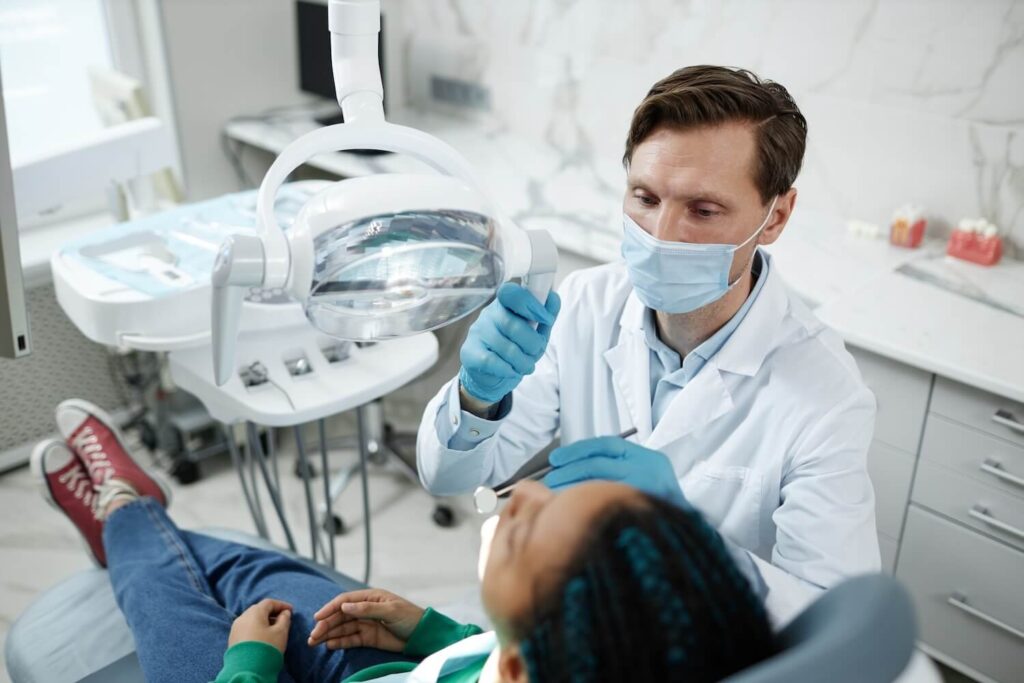Oral health is an integral component of overall well-being. While daily brushing and flossing are essential practices for maintaining healthy teeth and gums, they represent just the tip of the iceberg in oral care. General dentistry provides the professional oversight, preventive care, and personalized guidance necessary to keep your smile healthy and radiant. From routine cleanings to restorative treatments, general dentists offer a comprehensive approach that complements your at-home efforts and addresses the full spectrum of oral health needs.
In this article, we’ll explore the many ways general dentistry supports your daily oral care routine and why regular visits to your dentist are vital for maintaining optimal oral health throughout your life.
The Basics of General Dentistry
What Does General Dentistry Cover?
General dentistry focuses on preventing, diagnosing, and treating oral health problems. It includes routine care like cleanings, examinations, and x-rays, as well as more involved procedures such as fillings, crowns, and root canals. These services form the foundation of a healthy smile, addressing issues early and preventing them from escalating into more serious concerns.
Beyond clinical treatments, general dentists play a critical role in patient education, providing insights and strategies to enhance your daily oral hygiene practices.
The Difference Between General and Specialized Dentistry
Unlike specialized fields such as orthodontics or periodontics, general dentistry covers a broad spectrum of care for all ages. Your general dentist is often your first point of contact for any dental issue, referring you to a specialist only when necessary. This holistic approach makes general dentistry indispensable for maintaining ongoing oral health.
Preventive Care: The Cornerstone of Oral Health
Routine Cleanings and Check-Ups
No matter how diligently you brush and floss, plaque and tartar can accumulate in hard-to-reach areas. Professional cleanings remove these deposits, reducing your risk of cavities and gum disease. During these visits, your dentist will also examine your mouth for early signs of problems like decay or oral cancer, catching issues before they become severe.
The Role of Fluoride in Oral Health
Fluoride strengthens enamel, the protective outer layer of your teeth, making it more resistant to decay. Dentists often apply fluoride treatments during routine check-ups, especially for patients who are at higher risk for cavities. These treatments are quick, painless, and highly effective in fortifying your teeth.
Dental Sealants for Extra Protection
Dental sealants are a preventive treatment that involves applying a thin protective coating to the chewing surfaces of molars. These surfaces are prone to trapping food particles and bacteria, making them a common site for cavities. Sealants act as a barrier, preventing decay and making these teeth easier to clean.
Early Detection: The Key to Preventing Serious Issues
Detecting Cavities Early
Cavities often develop silently, with no noticeable symptoms until they’ve caused significant damage. General dentists use tools like digital x-rays and cavity-detection devices to identify decay in its earliest stages. Early detection not only minimizes the extent of damage but also allows for less invasive treatments.
Monitoring Gum Health
Gum disease, or periodontal disease, is a leading cause of tooth loss among adults. It begins with gingivitis, which can progress to more severe conditions if untreated. Regular dental visits include an assessment of your gum health, with dentists looking for signs of inflammation, recession, or pockets between the gums and teeth.
Oral Cancer Screenings
Oral cancer can be life-threatening if not caught early. During routine exams, your dentist will check for unusual lumps, sores, or discolorations in your mouth, throat, and neck. These screenings are a vital component of preventive dental care, as early detection significantly improves treatment outcomes.
Education: Empowering You to Care for Your Teeth
Personalized Oral Hygiene Advice
Your dentist can provide tailored recommendations to improve your oral care routine. For example, if you have difficulty reaching certain areas of your mouth, they might suggest specific tools like angled toothbrushes or water flossers. For patients with braces or dental restorations, dentists can offer strategies to clean effectively around these structures.
Nutritional Counseling
Diet plays a crucial role in oral health. Foods high in sugar or acidity can contribute to tooth decay and enamel erosion, while crunchy fruits and vegetables help clean your teeth naturally. Dentists can guide you toward a balanced diet that supports your oral health, emphasizing foods rich in calcium, vitamin D, and other essential nutrients.
Addressing Harmful Habits
Many common habits can harm your teeth and gums. For instance, nail-biting, chewing on ice, or using your teeth to open packages can cause chips and cracks. Dentists can help you recognize these behaviors and offer practical solutions, such as mouth guards to prevent teeth grinding at night.
Restorative Care: Fixing Issues and Restoring Smiles
Treating Cavities with Fillings
When decay damages a tooth, a filling restores its structure and function. Modern fillings are often made from composite resin, a material that blends seamlessly with the natural color of your teeth. This ensures that your smile remains aesthetically pleasing while addressing the cavity.
Crowns, Bridges, and Implants
Severely damaged or missing teeth require more extensive restorative treatments. Crowns, which are caps placed over damaged teeth, provide strength and protection. Bridges and implants replace missing teeth, restoring functionality and preventing issues like shifting teeth or bone loss in the jaw.
Root Canal Therapy
If tooth decay reaches the pulp—the innermost layer of the tooth—it can cause severe pain and infection. Root canal therapy removes the infected tissue, cleans the area, and seals the tooth to prevent further damage. This procedure saves the tooth and eliminates the need for extraction.
Specialized Support from General Dentistry
Sensitive Teeth Solutions
Tooth sensitivity can make eating and drinking uncomfortable. Dentists can pinpoint the underlying cause, whether it’s enamel erosion, gum recession, or cavities, and recommend treatments such as desensitizing toothpaste or fluoride applications.
Orthodontic Screenings and Referrals
General dentists often identify alignment issues that require orthodontic treatment. Early detection is especially important for children, as addressing problems like overcrowding or bite misalignment early can prevent more complex issues later.
Managing TMJ Disorders
Temporomandibular joint (TMJ) disorders can cause jaw pain, headaches, and difficulty chewing. Dentists can evaluate your symptoms and recommend treatments like bite splints or physical therapy to alleviate discomfort and improve jaw function.
How General Dentistry Supports Lifelong Oral Health
Building Healthy Habits in Children
Regular dental visits are crucial for children, as they lay the foundation for a lifetime of good oral health. Dentists teach kids how to brush and floss effectively, monitor the development of their teeth, and address issues like thumb-sucking or early signs of misalignment.
Supporting Adults and Seniors
As we age, our oral health needs evolve. General dentists provide care tailored to adults and seniors, from addressing gum disease and tooth wear to managing dry mouth and tooth loss. They also educate patients about the oral-systemic health connection, emphasizing the importance of oral care in preventing conditions like heart disease and diabetes.
Comprehensive Family Care
Many general dentists offer services for all age groups, making it convenient for families to receive care under one roof. This continuity fosters strong patient-dentist relationships and ensures consistent monitoring of oral health across generations.
Modern Technology in General Dentistry
Digital X-rays and Imaging
Digital x-rays provide detailed images with minimal radiation exposure, making them a safer and more efficient diagnostic tool. They allow dentists to detect issues like cavities, bone loss, and impacted teeth with precision.
Intraoral Cameras
Intraoral cameras give patients a clear view of their teeth and gums, helping them understand their oral health better. This technology enhances communication and fosters a collaborative approach to dental care.
Laser Dentistry
Lasers are increasingly used in general dentistry for procedures like cavity detection, gum contouring, and treating periodontal disease. They offer greater precision, reduced discomfort, and faster recovery times compared to traditional methods.
Addressing Common Concerns About Dental Visits
Overcoming Dental Anxiety
Fear of the dentist is a common barrier to care. Modern dental practices prioritize patient comfort, offering amenities like sedation options, calming environments, and clear communication to alleviate anxiety.
Managing Costs
Preventive care is an investment that saves money in the long run. Regular cleanings and exams reduce the likelihood of costly treatments by addressing issues early. Many dental offices also offer payment plans or work with insurance to make care more accessible.
Fitting Dentistry into a Busy Schedule
Life can get hectic, but neglecting dental visits often leads to more time-consuming problems down the line. Many dental practices accommodate busy schedules with evening or weekend appointments and streamlined check-in processes.
Conclusion: Your Smile Deserves the Best Care
While daily brushing and flossing are essential for maintaining oral health, they are only part of the equation. General dentistry provides the professional care, preventive measures, and expert guidance needed to support your efforts and ensure a lifetime of healthy smiles. By partnering with a trusted general dentist, you can protect your teeth and gums from potential issues, address existing concerns, and enjoy the confidence that comes with a radiant smile.
From routine cleanings to advanced restorative procedures, general dentistry is an indispensable ally in your oral health journey. Make regular dental visits a priority, and take the next step toward a brighter, healthier future—because your smile is worth it.


